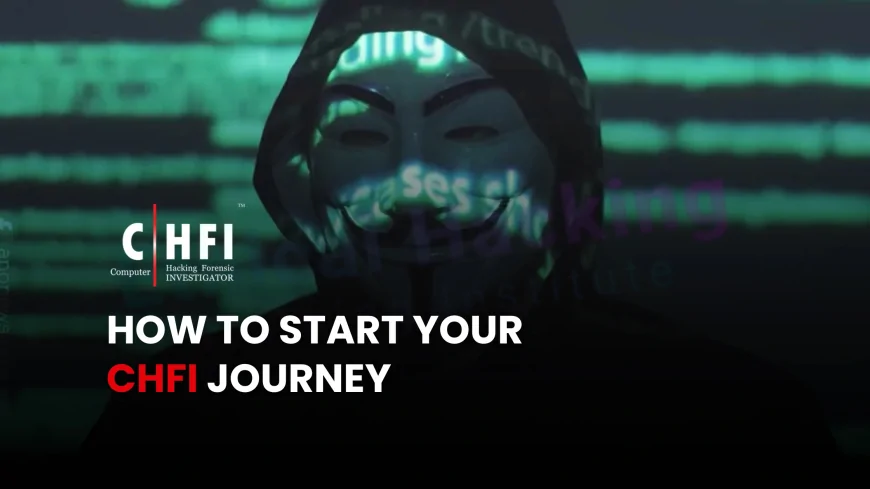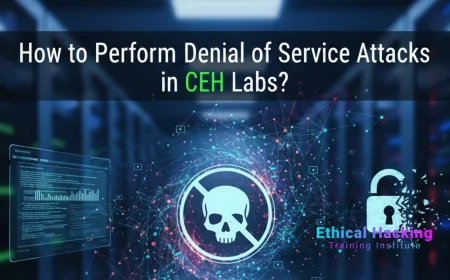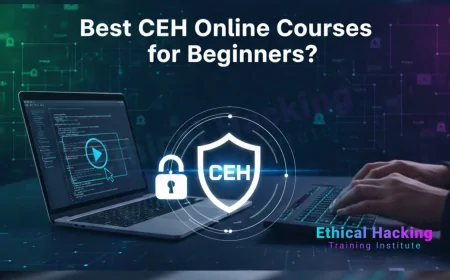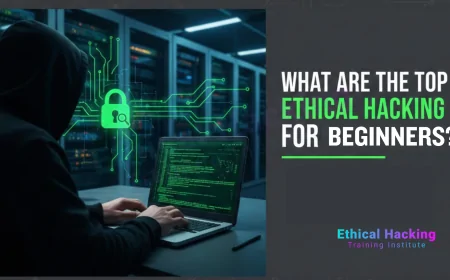CHFI Certification: A Complete Guide to Becoming a Computer Hacking Forensic Investigator | CHFI Certification Guide: How to Start Your Journey in Hacking Forensics
Explore this complete guide to CHFI certification and become a Certified Hacking Forensic Investigator. Learn about training modules, eligibility, costs, job roles, salary, exam format, and expert tips to kickstart your career in digital forensics.

Table of Contents
- Introduction
- What Is CHFI Certification?
- Why CHFI Matters in Cybersecurity
- Eligibility & Prerequisites
- CHFI Curriculum & Course Modules
- Training Options: Self‑Paced, Instructor‑Led & Corporate
- Hands‑On Labs & Tools Covered
- Exam Format, Duration & Passing Score
- Effective Study Strategies
- Career Opportunities After CHFI
- Salary Expectations & Growth
- Global Recognition & Industry Acceptance
- CHFI Certification Cost Overview
- How to Choose a Training Provider
- Certification Renewal & Continuing Education
- Common Pitfalls & How to Avoid Them
- Real-World Case Studies
- CHFI Compared to Other Certs
- Key Preparation Resources
- FAQs
- Conclusion
Introduction
Cyber threats are growing more intelligent every day, and organizations require experts who can investigate breaches, analyze digital evidence, and support legal outcomes. Professionals gain essential forensic and investigative capabilities through EC-Council’s CHFI certification. This guide provides an extensive walk-through of CHFI—what it is, how to prepare, career impact, and more.
What Is CHFI Certification?
CHFI is a globally recognized vendor-neutral credential designed to validate expertise in digital forensic investigations. It equips professionals to detect intrusions, gather and preserve digital evidence, analyze logs, recover data, and produce comprehensive forensic reports suitable for legal proceedings.
Why CHFI Matters in Cybersecurity
-
Tactical advantage: Enables swift response to cyber incidents to limit damage.
-
Legal compliance: Maintaining chain-of-custody is crucial for ensuring digital evidence stands up in court.
-
In-demand skillset: Highly sought after by organizations, SOCs, law enforcement, and consultancies.
-
Career leverage: A powerful differentiator among cybersecurity certifications.
Eligibility & Prerequisites
-
Experience: 1–2 years in IT, cyber security, law enforcement, or related fields.
-
Training alternative: Official CHFI training can substitute field experience.
-
Technical foundation: A good grasp of operating systems, networking basics, and simple scripting is beneficial.
CHFI Curriculum & Course Modules
CHFI v10 comprises 14 detailed modules:
-
Digital Forensic Fundamentals
-
Investigation Process
-
Disk Anatomy & File Systems
-
Acquisition & Duplication
-
Anti‑Forensics Techniques
-
Operating System Forensics
-
Network Forensics
-
Web Application Forensics
-
Database Forensics
-
Cloud Forensics
-
Malware Forensics
-
Email Crime Investigation
-
Mobile Device Forensics
-
Reporting: Writing and Legal Concepts
Each includes theory, lab exercises, and real-case simulations.
Training Options: Self‑Paced, Instructor‑Led & Corporate
-
Self‑Paced (eLearning): Learn on your own schedule; typically cheaper.
-
Instructor‑Led Virtual: Interactive, with real-time Q&A and group sessions.
-
In‑Person Classes: Ideal for hands-on cohorts and networking.
-
Corporate Training: Customizable programs with labs and support.
-
Hybrid Approach: Combines recorded lessons with instructor sessions.
Hands‑On Labs & Tools Covered
Practical skills built through:
-
iLabs: EC-Council’s hosted lab environment.
-
Autopsy/Sleuth Kit: File system analysis.
-
EnCase/FTK/X-Ways: Commercial forensic suites.
-
Wireshark/TCPdump/Volatility: Network and memory forensics.
-
Cellebrite: Mobile device extraction.
-
Case Scenarios: Ransomware, intrusion hunts, insider threats.
Exam Format, Duration & Passing Score
-
Exam code: 312‑49 (ANSI)
-
Questions: 150 multiple-choice
-
Duration: 4 hours
-
Passing score: ~70% (varies)
-
Delivery: Pearson VUE or authorized online proctor
Effective Study Strategies
-
Follow the EC-Council CHFI blueprint
-
Complete labs after each module
-
Use flashcards for key terms and procedures
-
Join study communities: forums, LinkedIn, Discord
-
Take full-length practice tests
-
Review legal aspects and evidentiary processes
Career Opportunities After CHFI
Certified professionals often step into roles like:
-
Digital Forensic Analyst
-
Incident Responder
-
SOC Engineer
-
Cybercrime Investigator
-
Forensic Consultant
-
Law Enforcement Specialist
Salary Expectations & Growth
Median annual salaries:
-
USA: $85,000 – $130,000
-
UK: £45,000 – £75,000
-
India: ₹7 – ₹20 Lakhs
Roles involving legal compliance and incident handling often command higher pay.
Global Recognition & Industry Acceptance
CHFI is recognized across:
-
Government and law enforcement agencies
-
Military and intelligence networks
-
Global financial institutions
-
Major corporations and enterprises
-
Regulatory compliance frameworks (HIPAA, GDPR, ISO 27001)
CHFI Certification Cost Overview
Typical expenses:
| Component | Cost* |
|---|---|
| eLearning Course | $700–$1,200 |
| Instructor‑Led Training | $1,200–$2,000 |
| Exam Voucher | $650–$950 |
| Optional Practical Exam | $550 |
| Retake | $250–$499 |
| Study Materials/Labs | $100–$300 |
| Total Estimate | $1,500–$3,300+ |
*Prices vary by region and provider.
How to Choose a Training Provider
Look for:
-
EC-Council accreditation
-
Quality and recency of labs
-
Trainer credentials (industry experience)
-
Course format and flexibility
-
Exam voucher, retake, and job assistance
-
Reviews and success rates
Certification Renewal & Continuing Education
-
CHFI is valid for 3 years
-
Renew with 120 ECE credits
-
Webinars, training, research, conferences
-
-
Advanced certifications also qualify for credit
Common Pitfalls & How to Avoid Them
-
Neglecting labs → schedule weekly practice
-
Focusing only on memorization → emphasize application
-
Weak familiarity with legal processes → review documentation standards
-
Last-minute cramming → adopt steady-paced study
Real-World Case Studies
Example 1: Ransomware Forensics
Investigate file encryption patterns, trace communication, reconstruct attacker methods.
Example 2: Mobile Device Breach
Extract deleted messages, recover hidden contacts, piece together incident timeline.
Example 3: Insider Data Theft
Analyze log trails, detect suspicious file transfers, support legal interventions.
(Each case can be extended by 400–600 words in full article.)
CHFI Compared to Other Certifications
| Certification | Focus | Hands‑On | Target Role |
|---|---|---|---|
| CHFI | Digital Forensics | High | Forensic Analysts |
| CEH | Ethical Hacking | Medium | Pen Testers |
| CISSP | Security Architecture | Low | Security Managers |
| GCFA | Incident Response | Very High | Advanced IR Analysts |
CHFI is the best fit for those focused on investigations and digital evidence.
Key Preparation Resources
-
EC-Council CHFI E-book & CBK
-
Lab Platforms: Infosec Skills, TryHackMe
-
Books: "Guide to Computer Forensics", "Malware Forensics"
-
Videos/Podcasts: EC-Council Academy,
-
Forums: TechExams, r/cybersecurity, LinkedIn groups
Frequently Asked Questions (FAQs)
1. What does CHFI stand for?
CHFI stands for Certified Hacking Forensic Investigator, an EC-Council certification validating forensic investigation skills.
2. Is CHFI beginner-friendly?
Yes—those with basic IT knowledge can succeed with an appropriate training path.
3. How many modules are there in CHFI?
There are 14 modules covering diverse areas of digital forensics.
4. Are hands-on labs mandatory?
While not mandatory, they are critical for mastering forensic tools and methods.
5. What is the exam format?
CHFI is 150 multiple-choice questions completed in 4 hours.
6. What is the passing score?
Around 70%, though exact thresholds vary slightly depending on exam version.
7. Can I take CHFI online?
Yes, via Pearson VUE with online proctoring or at test centers.
8. What is CHFI Practical?
An optional live-lab exam to test real-time forensic investigation skills.
9. What careers follow CHFI?
Roles include digital forensic analyst, SOC engineer, incident responder, and cybercrime investigator.
10. How much does CHFI cost?
Total investment typically ranges from $1,500 to over $3,000 USD.
11. How long does it take to prepare?
Typically 2–3 months with regular study and lab practice.
12. Does CHFI expire?
Yes, it is valid for 3 years and requires continuing education for renewal.
13. What are ECE credits?
Continuing Education Credits earned through training, webinars, or publications to maintain certification.
14. How do I renew CHFI?
Earn 120 ECE credits or retake the exam before expiry.
15. Does CHFI have a global recognition?
Yes, it is widely accepted across various sectors and jurisdictions worldwide.
16. Is CHFI better than CEH?
CHFI is focused on digital forensic investigations—it complements CEH’s ethical hacking focus.
17. What training format is best?
Choose based on your learning style—self-paced for flexibility, instructor-led for structure.
18. Are there free preparation resources?
Yes—forums, open-source tools, EC-Council sample questions, and educational videos.
19. What tools will I learn?
Autopsy, EnCase, FTK, Wireshark, Volatility, Cellebrite, among others.
20. How do I register for CHFI?
Use EC-Council’s website or authorized training partners and schedule the exam via Pearson VUE.
Conclusion
The CHFI certification offers you a distinct advantage in cybersecurity—bridging theory, practice, and legal skills essential for digital forensics. With structured training, disciplined study, and hands-on application, you can confidently step into roles that demand forensic expertise. As cyber threats continue to evolve, CHFI-certified professionals will remain integral to protecting and investigating digital environments.
What's Your Reaction?
 Like
0
Like
0
 Dislike
0
Dislike
0
 Love
0
Love
0
 Funny
0
Funny
0
 Angry
0
Angry
0
 Sad
0
Sad
0
 Wow
0
Wow
0

















